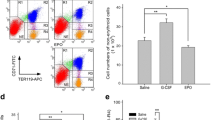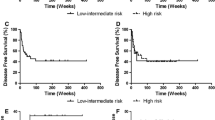Abstract
We report a patient with refractory anemia with excess blasts who showed a lineage-unrestricted hematologic response to granulocyte colony-stimulating factor (G-CSF). After 17 months of a stable disease state, the patient developed pneumonia, progression of cytopenia, and reduced cellularity and blast mass in the bone marrow. He was given G-CSF to overcome the pneumonia. Not only the neutrophil count, but also the platelet count increased soon after initiation of the G-CSF therapy; both counts became normal on the fifth day of the G-CSF therapy. Additionally, the anemia improved gradually. The neutrophil and platelet counts were maintained in the normal range for 3 months after cessation of the G-CSF. In vitro studies showed that G-CSF alone stimulated megakaryocyte colony formation from bone marrow mononuclear cells (BMMNC), and accessory cells in the BMMNC were necessary for expression of this G-CSF-induced in vitro megakaryocytopoiesis. These results suggest that, in coordination with accessory cells, G-CSF stimulated megakaryocytopoiesis in the patient. This case provides valuable information for understanding the mechanisms of a lineage-unrestricted hematologic response to G-CSF, which is very rarely observed in MDS.
Similar content being viewed by others
References
Bassen FA, Kohn JL (1952) Multiple spontaneous remissions in a child with acute leukemia: the occurrence of agranulocytosis and aplastic anemia in acute leukemia and their relationship to remissions. Blood 7:37–46
Bruno E, Briddell R, Hoffman R (1988) Effect of recombinant and purified hemotopoietic growth factors on human megakaryocyte colony formation. Exp Hematol 16:371–377
Chiba S, Inamori K, Mitani K, Hirai H, Yazaki Y (1994) Marked and reproducible increase in trilineage blood cell counts by administration of granulocyte colony-stimulating factor in a patient with refractory anemia with excess blasts in transformation. Br J Haematol 86:665–667
Dan K, An E, Futaki M, Inokuchi K, Gomi S, Yamada T, Ogata K, Tanabe Y, Ohki I, Shinohara T, Nomura T (1993) Megakaryocyte, erythroid and granulocyte-macrophage colony formation in myelodysplastic syndromes. Acta Haematol 89:113–118
Furukawa T, Takahashi M, Moriyama Y, Koike T, Kurokawa I, Shibata A (1991) Successful treatment of chronic idiopathic neutropenia using recombinant granulocyte colony-stimulating factor. Ann Hematol 62:22–24
Gordon MY, Riley GP, Watt SM, Greaves MF (1987) Compartmentalization of a haematopoietic growth factor (GM-CSF) by glycosaminoglycans in the bone marrow microenvironment. Nature 326:403–405
Ikebuchi K, Clark SC, Ihle JN, Souza LM, Ogawa M (1988) Granulocyte colony-stimulating factor enhances interleukin 3-dependent proliferation of multipotential hematopoietic progenitors. Proc Natl Acad Sci USA 85:3445–3449
Kojima S, Matsuyama T (1994) Stimulation of granulopoiesis by high-dose recombinant human granulocyte colony-stimulating factor in children with aplastic anemia and very severe neutropenia. Blood 83:1474–1478
McNiece IK, McGrath HE, Quesenberry PJ (1988) Granulocyte colony-stimulating factor augments in vitro megakaryocyte colony formation by interleukin-3. Exp Hematol 16:807–810
Ogata K, Dan K, Kuriya S, Nomura T (1990) Anti-thoracic duct lymphocyte globulin stimulates human megakaryocytopoiesis in vitro. Blut 60:202–205
Ohno R, Tomonaga M, Kobayashi T, Kanamaru A, Shirakawa S, Masaoka T, Omine M, Oh H, Nomura T, Sakai Y, Hirano M, Yokomaku S, Nakayama S, Yoshida Y, Miura AB, Morishima Y, Dohy H, Niho Y, Hamajima N, Takaku F (1990) Effect of granulocyte colony-stimulating factor after intensive induction therapy in relapsed or refractory acute leukemia. N Engl J Med 323:871–877
Paul R, Remes K, Lakkala T, Pelliniemi TT (1994) Spontaneous remission in acute myeloid leukaemia. Br J Haematol 86:210–212
Rey C, Bader-Meunier B, Tertian G, Mielot F, Tchernia G, Yver A (1993) Trilineage response to recombinant granulocyte colony-stimulating factor administration in a patient with myelodysplastic syndrome. Am J Hematol 43:76–77
Roberts R, Gallagher J, Spooncer E, Allen TD, Bloomfield F, Dexter TM (1988) Heparan sulphate-bound growth factors: a mechanism for stromal cell-mediated haemopoiesis. Nature 332:376–378
Saeland S, Caux C, Favre C, Aubry JP, Mannoni P, Pebusque MJ, Gentilhomme O, Otsuka T, Yokota T, Arai N, Arai K, Banchereau J, de Vries JE (1988) Effect of recombinant human interleukin-3 on CD34-enriched normal hematopoietic progenitors and on myeloblastic leukemia cells. Blood 72:1580–1588
Ueda T, Kawai Y, Sugiyama T, Takeuchi N, Yoshida A, Iwasaki H, Wano Y, Tsutani H, Kamada N, Nakamura T (1993) Sequential promotion of normal and leukemic hematopoiesis by recombinant human granulocyte colony-stimulating factor during the course of myelodysplastic syndrome. Int J Hematol 59:47–52
Washizuka T, Koike T, Toba T, Nagai K, Takahashi M, Shibata A (1992) A rise of erythrocytes and platelets in a patient with myelodysplastic syndrome during the administration of G-CSF. Am J Hematol 39:153–154
Willfort A, Lorber C, Kapiotis S, Sertl S, Hainz R, Kirchweger P, Jager U, Kyrle PA, Lechner K, Geissler K (1993) Treatment of drug-induced agranulocytosis with recombinant granulocyte colony-stimulating factor (rh G-CSF). Ann Hematol 66:241–244
Williams GT Christpher AS, Spooner E, Dexter TM, Tayler DR (1990) Haematopoietic colony stimulating factors promote cell survival by suppressing apoptosis. Nature 343:76–79
Yoshida Y (1993) Hypothesis: apoptosis may be the mechanism responsible for the premature intramedullary cell death in the myelodysplastic syndrome (review). Leukemia 7:144–146
Yoshida Y, Hirashima K, Asano S, Takaku F (1991) A phaseII trial of recombinant human granulocyte colony-stimulating factor in the myelodysplastic syndromes. Br J Haematol 78:378–384
Author information
Authors and Affiliations
Rights and permissions
About this article
Cite this article
Yokose, N., Ogata, K., An, E. et al. Lineage-unrestricted hematologic response to granulocyte colony-stimulating factor in a patient with refractory anemia with excess blasts. Ann Hematol 70, 163–167 (1995). https://doi.org/10.1007/BF01682038
Received:
Accepted:
Issue Date:
DOI: https://doi.org/10.1007/BF01682038




